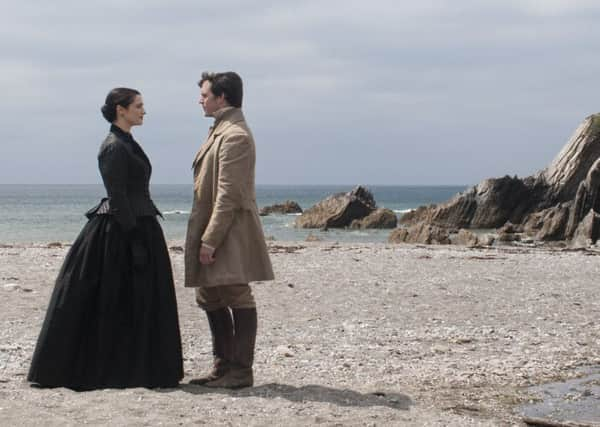Film reviews: My Cousin Rachel | Berlin Syndrome | The Shack


My Cousin Rachel (15) ****
Berlin Syndrome (15) ****
The Shack (12A) *
Rachel Weisz is on fantastic form in the title role of My Cousin Rachel, a tasteful yet quietly sinister adaptation of Daphne du Maurier’s gothic period novel of the same name. Adapted and directed by Roger Michell (working more in the mode of The Mother and Enduring Love than Notting Hill), he and Weisz have put a satisfying feminist slant on this tale of a woman in 1830s England whose suspected complicity in the recent death of her husband torments his soon-to-be-heir. Sam Claflin plays the latter, a callow young man called Philip whom we’re told at one point knows nothing about women. This may be a consequence of growing up motherless (he was orphaned as a child). Or it may simply be a by-product of being handsome, rugged and entitled in a patriarchal society where breeding not reading determines who gets ahead. His misreading of his own situation is certainly one of the driving forces of the film. Told from his point of view, it begins with Philip preparing for the arrival of Rachel from Italy, where his surrogate father, Ambrose, had retreated for health reasons. Ambrose’s marriage to the mysterious Rachel is rumoured to have hastened his swift decline from a suspected brain tumour and Philip – his suspicions aroused by fevered letters sent by Ambrose in his final weeks – is determined to exact some form retribution. But all Philip’s pent-up hostility is immediately dispelled upon meeting Rachel and he’s soon captivated by her beguiling presence – or at least, beguiling to him.
That’s the nicely handled trick of the film. It subtly encourages us to view Rachel through Philip’s naive eyes while simultaneously presenting a more rounded and objective view of her via careful framing and ambiguous dialogue. Weisz’s performance has a lot to do with this. Rachel is repeatedly set up to comply with the sort of coquettish or femme fatale tropes cinema lazily mines, but Weisz subverts them, playing Rachel in ways that feel recognisably human, not coldly calculating. This, in turn, recasts Claflin’s misguided nobility and chivalrous attempts to provide for her as suffocating, almost monstrous gestures. Excellent support from Iain Glen (as Philip’s godfather) and Holliday Grainger (as his former love interest) help maintain the shifting balance of sympathy between leads. Michell’s craftsmanship, meanwhile, keeps the melodramatic undercurrents in check – something that helps intensify the deliciously dark implications of the excellent final scene.
Advertisement
Hide AdComplex gender relations are at the heart of Berlin Syndrome as well. The third feature from Australian writer/director Cate Shortland, it takes an artful approach to the sort of backpackers-in-peril premise commonly found in exploitation cinema. Adapted from Melanie Joosten’s novel about an Australian photographer whose instant attraction to a Berlin local develops into an all-too-plausible nightmare scenario, the film hinges on Teresa Palmer’s enigmatic turn as the life-experience-seeking Clare, whose openness to the world she’s documenting on her extended trip attracts the attention of school teacher Andi (Max Riemelt). He seems like a nice guy on the surface, but as their relationship takes a turn for the sensuous, Clare discovers that his gentle demeanour is part of a calculated strategy to keep her in his life against her will. What follows is a skilful, delicately wrought character study, one that riffs on the implications of its title in intriguing ways. At first, Clare gives her captor the benefit of the doubt because the alternative is too awful to contemplate and accept. But as the seriousness of her situation dawns on her, she has to figure out a survival strategy that will enable her to bide her time until a successful escape attempt is possible. Here, the film makes good use of Berlin, particularly the sparsely populated apartments of the more industrialised areas of the city’s east side. To the artists and hipsters for whom the city as a whole has become a beacon, this is outlier territory, but its dreary functionality is perfect for the sort of pathological project Andi has dreamt up to alleviate his own boredom and hinted-at-family issues. Punctuated with moments of extreme horror that reinforce her heroine’s resilience and her own filmmaking nous, this is further evidence of Shortland’s growing stature on the world film stage.
Coincidentally, one of the breakout stars of Shortland’s debut film Somersault takes the lead in The Shack. Alas, for Sam Worthington, who went on to star in Avatar, The Shack is a further sign of the weird ways in which an actor’s career can have severe peaks and troughs. Worthington isn’t terrible in this bizarre faith-based tale about a father learning to reconnect with God after his youngest daughter is abducted and murdered. But there’s only so much he can do with a film that essentially casts him as a live-action Ned Flanders, then subjects him to the sort of ordeal you might find in a David Fincher movie, before lurching into an absolutely bonkers fantasy in which – bear with me here – he gets to spend a weekend with God (Octavia Spencer) and Jesus (Avraham Aviv Alush) learning how to walk on water at their Eden-like woodland retreat. Serving up a series of comforting myths about God’s ability to heal suffering in a world in which tragedy is unavoidable, it’s a film about learning to forgive – a handy skill if you actually find yourself watching this gibberish. ■